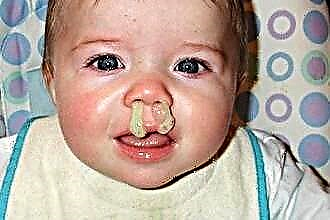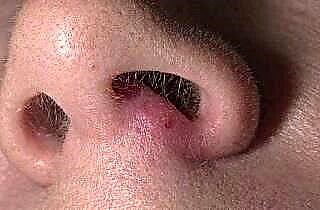During pregnancy, the defense mechanism of the female body does not function at full capacity, so the risk of catching a viral or bacterial infection increases. So, especially often pregnant women suffer from rhinitis. And since, against the background of reduced immunity, any disease progresses rapidly, with untimely or improper treatment, an ordinary runny nose can quickly turn into inflammation of the maxillary sinuses (sinusitis). Sinusitis during pregnancy is dangerous not only because it can harm the mother, but also because it can have serious consequences for the child. The problem is also exacerbated by the fact that a pregnant woman is contraindicated in most of the effective drugs that are used in the treatment of this disease.
The immune system during pregnancy
 During the carrying of a child, the work of the female body is significantly rebuilt in order to cope with the additional load.
During the carrying of a child, the work of the female body is significantly rebuilt in order to cope with the additional load.
The correct course of pregnancy, the normal development of the fetus and natural childbirth become possible, including due to hormonal changes in the woman's body.
Considering that 50% of the genetic information the embryo receives from the father, mechanisms are activated that protect the fetus from the attacks of the immune system and do not allow the mother's body to reject cells foreign to it.
Immediately after conception, special hormones begin to be produced, which ensure the safety of the embryo, but at the same time partially suppress the specific (acquired) immunity of the woman.
During this period, the body of the expectant mother is protected mainly only by nonspecific (innate) immunity. In this regard, there is a high risk of exacerbation of chronic diseases. In addition, a woman becomes much more susceptible to various kinds of infections. At this time, one should be very careful about any, even the most insignificant, ailments, such as a runny nose, with which a weakened immune system cannot always cope on its own.
Causes and symptoms of sinusitis
Sinusitis during pregnancy can occur for a number of different reasons, of which the most common is an untreated or neglected acute respiratory illness (cold). The woman's body is weakened and, accordingly, more sensitive to hypothermia, and also more susceptible to viruses. In most cases, a common runny nose does not receive proper treatment and does not become a reason to see a doctor. However, given the peculiarities of the female body, attention should be paid to rhinitis, since with the addition of a bacterial infection, mucous discharge in the maxillary sinuses becomes purulent and, thus, a mild cold can quickly transform into sinusitis in pregnant women.
The fact is that when carrying a child, the woman's body works in an enhanced mode. Among other things, there is an increase in the production of mucus for various purposes, including nasal mucus, which becomes more viscous and abundant. Considering that with ARVI in the maxillary sinuses, exudate appears in any case (which in itself is not sinusitis), an increase in its concentration leads to the fact that pathogenic bacteria receive a favorable environment for life.
 In addition to this, swelling of the nasal mucosa blocks the opening connecting the sinus and the nasal passage, which hinders the outflow of purulent-mucous secretions and contributes to the development of sinusitis in pregnant women.
In addition to this, swelling of the nasal mucosa blocks the opening connecting the sinus and the nasal passage, which hinders the outflow of purulent-mucous secretions and contributes to the development of sinusitis in pregnant women.
In addition, sinusitis can be triggered by one of the following reasons:
- poor oral hygiene;
- inflammation of the upper teeth;
- curvature of the nasal septum;
- trauma to the wall of the maxillary sinuses;
- allergic reaction;
- neoplasms.
In any case, the treatment should be prescribed by an appropriate specialist. If sinusitis is caused by trauma, neoplasms, or a deviated nasal septum, then surgery is likely to be required. If the maxillary sinuses are inflamed as a result of an allergic reaction of the body, then you must first identify and then try to eliminate the allergen.
Regardless of the cause, it is important to consult a doctor at the very first symptoms of sinusitis, since this disease is much easier to treat at the initial stages. The consequences of sinusitis during pregnancy, especially in the early stages (first trimester), can be dangerous not only for the mother (damage to the organs of vision, hearing, meningitis), but also for the embryo. Due to the edema of the nasal membrane, the maxillary sinus becomes closed and practically no air enters it, as a result of which the mother's body does not receive the oxygen it needs. This, in turn, can lead to fetal malformations associated with hypoxia.
The clinical picture of inflammation of the maxillary sinuses is usually expressed by the following symptoms:
- severe nasal congestion;
- yellow-green nasal discharge;
- increased body temperature (with acute sinusitis);
- violation of smell (hyposmia, anosmia);
- dull headache;
- pain in the area of the maxillary sinuses, which intensifies when bending forward.
Diagnosis of sinusitis
Usually, to diagnose sinusitis, specialists use an x-ray of the paranasal sinuses or the results of a computed tomography. However, during pregnancy, both of these procedures are contraindicated for women, therefore, when making a diagnosis, doctors take into account the presence of a set of signs characteristic of this pathology, and also rely on the data:
- diaphanoscopy (transillumination of the maxillary sinuses);
- Ultrasound of the area of the maxillary sinuses;
- studies carried out using a thermal imager;
- puncture.
Medication for sinusitis
Despite the fact that women in the position are advised to avoid drug therapy, the appearance of the first symptoms of sinusitis during pregnancy is accompanied by the immediate start of taking medications. The fight against sinus inflammation cannot be complete without antibiotics, so doctors, as a rule, select the most effective of the least aggressive agents. These drugs include non-toxic drugs of the penicillin group and cephalosporins.
Of course, antibiotic therapy can only be started after consulting an otolaryngologist. In addition, it is imperative to check the dosage and contraindications, which are indicated in the instructions for the medicinal products. There are many antibiotics, the use of which depends on the stage of pregnancy. So, during the first trimester, this or that drug can harm the embryo, and already during the third trimester, the same drug will have a therapeutic effect on the mother's body and absolutely will not harm the unborn child.
 In combination with antibiotics, patients usually take medications aimed at restoring normal intestinal microflora.
In combination with antibiotics, patients usually take medications aimed at restoring normal intestinal microflora.
Depending on the patient's condition and the severity of the disease, in addition to antibacterial agents, doctors may prescribe topical medications. For example, in order to relieve swelling of the nasal mucosa, vasoconstrictor drops are usually used, but during pregnancy, their use is not recommended or (if unavoidable) should be as short as possible (2-3 days).
In cases of advanced illness or the development of complications, the decision to take drugs of strong action is made by the doctor, who must be sure that the intended benefit to the mother outweighs the potential risk to the embryo.
Proetz nose wash and puncture
Since sinusitis during pregnancy cannot be influenced by strong antibacterial drugs, doctors often try to enhance the effect of treatment with additional procedures. In the early stages of the course of the disease, one of these procedures is washing according to the Proetz method, popularly called the "cuckoo". The purpose of this process is to pump out mucopurulent discharge from the sinus and to disinfect the sinus. This procedure involves the use of special devices - a catheter and a suction - inserted into the nasal passages. Thanks to the first, a solution of furacilin enters the nasal cavity, and the second allows the accumulated exudate to be pumped out of the sinus. In order to prevent the discharge from entering the larynx and completely out of the nose, the patient must repeat the "cuckoo" during the procedure. I have tried many virtual casinos, but still Vulkan Russia became my favorite. On this site https://ratingcazino.ru I can sit for hours and do not get bored. Exciting slot machines, valuable prize money, a bunch of pleasant bonuses and gifts - everything that a true gambler needs.
Nasal lavage according to Proetz helps to flush out pathogenic organisms, dilute and remove mucopurulent exudate from the sinuses and reduce nasal congestion. However, the "cuckoo" is effective mainly for mild disease. And in more severe cases, aggravated by the ban on the use of potent antibiotics, domestic otolaryngologists often resort to a puncture. In such cases, this process is not diagnostic, but therapeutic.
Under local anesthesia, the patient's sinus wall is pierced with a large needle bent at the tip. After that, a syringe with saline is attached to the needle for washing. As a result, mucopurulent discharge goes out through the oral cavity into a specially prepared vessel. Then, in order to prevent the re-accumulation of purulent masses, anti-inflammatory, antiseptic drugs or antibiotics are injected into the sinus.

Complementary treatment
Since sinusitis during pregnancy can lead to very serious consequences for both the mother and the child, it must be treated as soon as possible.
For this, in addition to medication and the above procedures, the patient can use homeopathic remedies or traditional medicine methods.
Such therapy must also be agreed with the attending physician. Among the most popular folk recipes are:
- rinsing the nose with salted water and decoctions of medicinal herbs;
- preparation of natural drops based on aloe / beet / eucalyptus;
- inhalations based on herbal decoctions.



